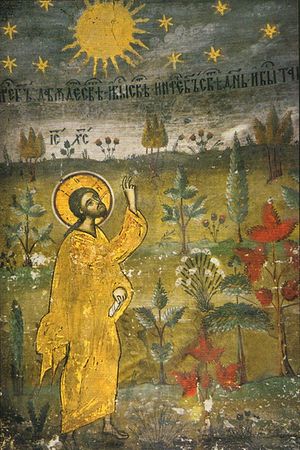In this article Jesse Dominick provides an excellent summation of what Maximus has to say on these topics.
++++++++++++++++++++++++++++++++++++++++++++++++++++++++++++++++++++++++


Hesychasm, the spiritual underpinning of Eastern Orthodox spirituality, based upon the frequent repetition of the Jesus Prayer, seeks to instill in its practitioners a strong sense of inner stillness, leading to silent, imageless contemplation. Does this mean navel-gazing on a mountaintop? Far from it. Orthodox writer Philip Sherrard has some incisive observations on the relevance of hesychasm to the so-called "real world". His essay "The Revival of Hesychast Spirituality" appears in Louis Dupre' and Don E Saliers, eds, Christian Spirituality: Post-Reformation and Modern, Crossroad 1996. The excerpt below appears on p 428.
+++++++++++++++++++++++++++++++++++++++++++++++++++++++++++++++++++
Hesychasm by no means scorns or undervalues human love and service. It is emphatically not "otherworldly" as this term is usually understood. On the contrary it insists, as we have seen, that the whole of creation is impregnated with God's own life and being and that consequently there can be no true love of God that does not embrace every aspect of creation, however humble and limited. Its purpose is not to abandon the world to annihilation and self-destruction, but to redeem it.
It is to redeem it by transfiguring it. But for the hesychast this transfiguration presupposes the transformation of human consciousness itself, so that it becomes capable of perceiving the divinity that lies at the heart of every created form, giving each such form its divine purpose and determining its intrinsic vocation and beauty. In other words, hesychasts will consider that the way for them, as for any other person, best to serve, at least initially, fellow humans and all other created beings, will be to bring the love and knowledge of God to birth within themselves; for until that has been achieved, their outward actions, instead of being the necessary expression of this love and knowledge, will be tarnished both with self-love and with the idolatry of which we have spoken. This will make it clear why hesychasm is and must be first of all a way of contemplation. For it is only through the contemplative life in all its aspects--ascetic watchfulness, prayer, meditation, the whole uninterrupted practice of the presence of God to which the Philokalia is the guide--that humans can actualize in themselves the personal love and knowledge of God on which depend not only their own authentic existence as human beings but also their capacity to cooperate with God in fulfilling the innermost purposes of creation.







